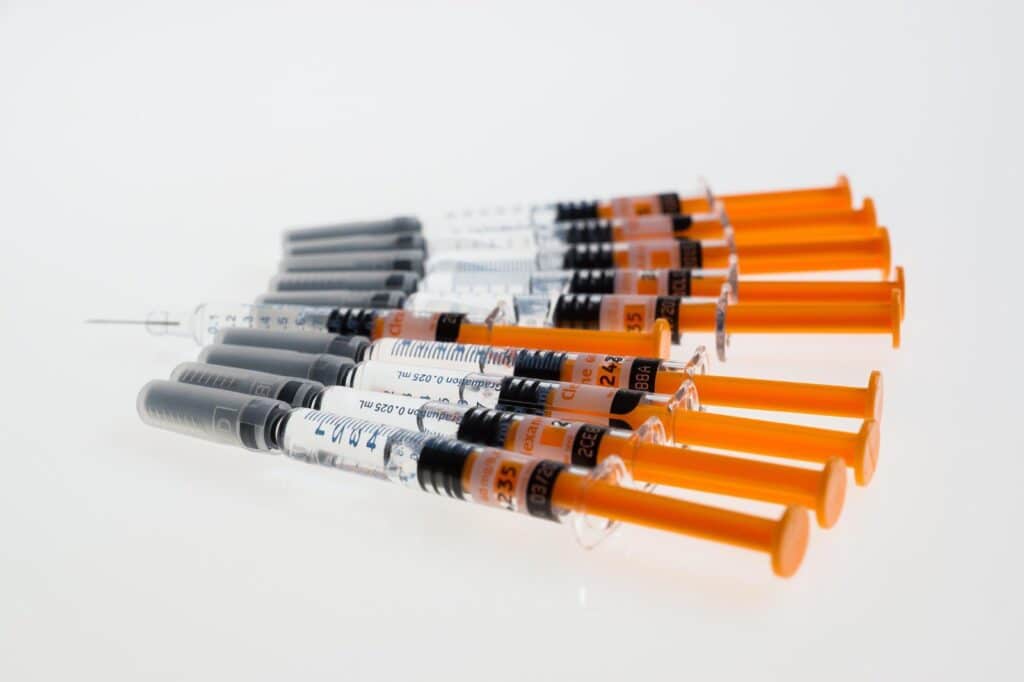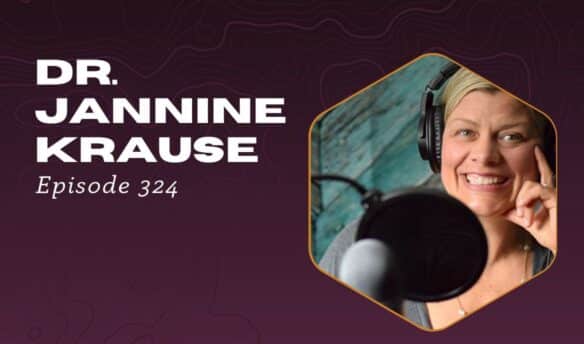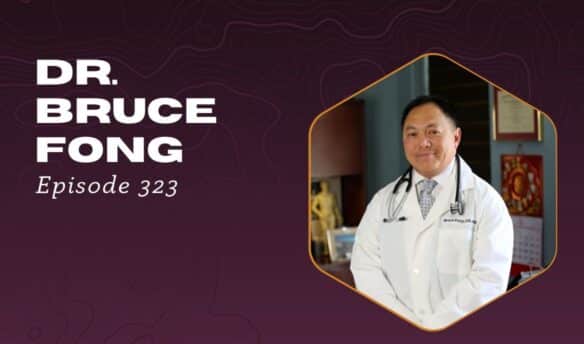The topic of vaccines is controversial and likely you’ve found yourself wondering, are vaccines good or bad for you?
It’s hard to sift through all of the information on both sides of the debate to understand what’s applies to you.
You might be thinking that you have no control over what a vaccine does in your body and that freaks you out.
You can control how your body reacts to a vaccine.
Vaccines have been linked to autism, autoimmune conditions and even death.
Yet vaccines have the potential to save lives and eradicate disease.
With the pros and cons always in the news, your left wondering who is telling the truth?
A Doctor’s Perspective on Vaccines
As a doctor I see the benefits of vaccines in daily.
I have seen side effects of vaccines when an individual is not eating healthy, extremely stressed, or suffering with hormonal or digestive imbalances when they had their vaccine.
I have also seen negative reactions when patients are given multiple vaccines in one day.
I am not anti-vaccine, it’s how we recommend them to patients that I question.
I support individualized vaccine schedules for children and adults where only one vaccine is given at a time to allow the immune system to react effectively.
The standard American diet with processed genetically modified foods affects your immune system and the poorer quality of food you choose to eat combined with your stress levels, hormonal and digestive balance predicts if you will have a negative reaction to vaccines.
To make an informed decision on vaccines you have to understand what they do.
What Do Vaccines Do?
Vaccines were created to eradicate diseases that have the potential to cause death or lasting effects such as paralysis.
Vaccines work by exposing yourself to DNA particles of a disease such as a virus or bacteria via injection or nasal spray.
Once the particles of the virus or bacteria get into your bloodstream your immune system reacts to create antibodies to the virus or bacteria so that if it’s exposed to the virus or bacteria it has the antibodies to attack it.
Have Vaccines Eradicated Disease?
The first vaccine was created against smallpox in 1798.
According to the CDC, smallpox was eradicated in 1979.
The polio vaccine was developed in the 1950s.
At this point in time, there are only three countries that still have polio: Pakistan, Afghanistan, and Nigeria.
Data shows that by the end of 2018 polio may be completely eradicated.
Mumps and diphtheria were documented in 400 B.C.
There are vaccines to both of these very old diseases.
Mumps and diphtheria are increasing in the US due to a global society and a reduction in those being vaccinated against these diseases.
Dr. Krause’s Thoughts on A Few Vaccines
Hepatitis B
Hepatitis B can live in dried blood for up to seven days.
You might have cuts or scrapes on your skin and be exposed without your knowledge.
Hepatitis B is hard on the liver, it’s costly and it shortens your lifespan.
Higher risk of hepatitis B in healthcare workers.
Sexual preferences can put you at risk for hepatitis B with anal sex being a high risk factor.
To counter Hepatitis B it is now given to babies at birth.
Babies don’t start to develop their own immunities until six months of age.
And if their risk factors are low for Hepatitis B it’s best to wait to vaccinate till the immune system is more mature.
Dr. Krause recommends waiting till a child is deemed healthy, eating healthy whole foods and then consider vaccination.
Tetanus, Diphtheria and Pertussis
Tetanus and diphtheria are typically paired together in one vaccination.
In a perfect world, I would love people to get vaccines separately.
Unfortunately, it’s just not as common to get those single-dose vials.
Tdap is tetanus, diphtheria, and pertussis all rolled into one vaccine.
Pertussis is the respiratory illness that is most threatening to babies.
I think these are important vaccinations to have.
The reason being is diphtheria is a bacteria it is pretty virulent.
The bacteria can close off your airway and kill you.
Tetanus is important, especially if you’re a gardener or an outdoor enthusiast.
You can get this from rusty nails, rusty auto parts, things on the ground that might be discarded and rusting.
Tetanus can kill you quickly and it has nasty side effects for the neurological system as opposed to the influenza virus that will not kill healthy adults.
Influenza
The flu vaccine is not foolproof because you’re getting one virus in this vaccine.
There are many flu viruses going around so there’s no guarantee it will be effective.
I recommend this vaccine for folks who are elderly, immunocompromised, live with someone who is immunocompromised, elderly or very young.
If you have an overactive immune system, such as in the case of autoimmune disease, I do not recommend the flu shot.
A vaccine is made to stimulate your immune system and if it is already overactive it could send it into overdrive.
Keep in mind you always have to weigh out the benefit versus the risk of not getting the vaccine.
Vaccines save lives and have worked to eradicate disease.
The flu shot when given to healthy individuals will protect you from the flu and may lessen symptoms of the flu if you get a variation of the virus used for your vaccine.
You have to weigh out how much of an inconvenience being sick would be for you and who you might expose that might not be able to fight it.
On the other hand getting sick is a good test for your immune system to make sure it’s strong and can fight when it needs to.
That being said there are a lot of things to think about when deciding whether to get a vaccine or not.
Vaccines are there to prevent us from severe illnesses that could lead to permanent side effects such as paralysis or death.
If I have a patient that I suspect could die if they contracted the influenza virus or a bacterial pneumonia I make sure to recommend they get those vaccines.
In particular I recommend the pneumonia vaccine for my elderly patients, young, immunocompromised and those living in families with elderly or immunocompromised individuals.
Shingles and Chickenpox
You’re not going to die from shingles or chickenpox.
You might suffer with pain, neuropathy or scarring that can last a lifetime.
You have to weigh out if you want to deal with those things or not.
There are natural solutions.
Acupuncture can reduce the symptoms of shingles if caught in the first few days.
Vitamin B12 and Lysine are excellent for helping with the itching and pain with shingles when taken in the first few days of onset.
HPV
Human papillomavirus vaccines are relatively new compared to a lot of vaccines.
Enough time has not elapsed to know the long term effects of this vaccine.
Gardasil has been linked to amenorrhea and infertility in women.
Both of these issues have been on the rise since the introduction of this vaccine.
There are pros and cons to the HPV vaccine, your decision should be based on your lifestyle and sexual choices.
Do Vaccines Cause Autism?
Studies have ruled out the connection between autism and vaccines.
There are connections between toxic bodies, poor diet and autism.
Many children are eating genetically modified foods with a lot of preservatives, and food colorings.
Their little bodies are inflamed and their immune systems are working overtime because of the food they’re eating.
Add to that the environmental toxins they have to deal with each day.
Vaccines cause the immune system to work overtime, which can result in the body beginning to attack itself.
This may be where the connection between illnesses and vaccines comes from.
Vaccines have been around since the late 1700’s why are there increasing reports about side effects?
How to Prepare for Vaccines
If you’re going to get vaccinated, the important thing is to make sure that your body is healthy enough for the vaccine.
There are a few things you can do ahead of time to prepare your body for a vaccine.
Clean up your immune system
Never get a vaccine when you are sick, have sinus congestion, gut issues, experiencing allergy symptoms or suffering with skin conditions, such as unexplained rashes, eczema, psoriasis.
Make sure your body and joint pain is at a minimum.
The best way to go about this is to do a detox of your liver and your lymphatic system.
Start the Whole 30 diet, or start eating clean.
No toxins, no alcohol, no processed foods, no additives.
Do this for a month before you get a vaccine and your body is going to be a lot better off.
If you can’t do a month, at least do two weeks so that your immune system is not on hyper alert when you get your vaccine.
Instead of being anti-vaccine prepare your immune system to accept the vaccine and let it do it’s job effectively.
Separate out the vaccines
If you’re an adult and you need to get booster vaccines, see if you can get single-dose vaccines.
This will help you avoid overloading the immune system all at once.
If you have children and you’re trying to figure out what to do about their vaccine schedules, talk with a naturopathic doctor.
There are also resources online such as Dr. Paul Thomas who has a schedule recommendation here.
The Paleo Mama has a version that is similar to what I would recommend to patients.
Avoid superfoods
This may seem like odd advice.
Superfoods boost your immune system.
You don’t want your immune system on hyper alert when you get a vaccine.
Keep them out of your system for at least 2 weeks prior to vaccination.
Detox the liver
Drink lots of water and take milk thistle (Gaia Herb’s is my favorite) prior to vaccines to clean up your liver.
I usually recommend doing this for a month beforehand.
You can also add ¼ cup of cilantro, celery, parsley, 1 cup of cucumbers, and cranberries to your diet for a month to aid your liver in this process.
Knowledge is Power – Arm Yourself with It
It’s important to be informed about both sides of the vaccine discussion.
Familiarize yourself on why vaccines are recommended and what they do for you and your community.
Know the risks of not getting a vaccine and the benefits of having the vaccines.
If you decide to get a booster or need a vaccine for travel, make sure your health is optimal when you get your vaccine.
Plan ahead so that you can get vaccinated when your immune system is neither compromised nor overactive.
Knowledge is power, make your vaccination decision based your health and what it means for the health of your community.
Vaccines are beneficial and have eradicated serious life threatening diseases.
The key to a successful vaccination starts with you and your health status.
Prepare yourself for your vaccination, spread them out to let the immune system work effectively and you will greatly minimize negative outcomes.
If you enjoyed this article there’s a podcast dedicated to the same subject. Click HERE to listen to Dr. Jannine Krause’s Podcast on Vaccines.
youtube





